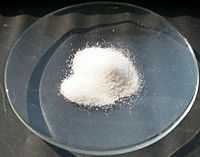
Photo from wikipedia
Simple Summary Development of resistance to chemotherapeutics during the treatment of human cancers is a serious problem in the clinic, resulting in a poor treatment outcome and survival. It is… Click to show full abstract
Simple Summary Development of resistance to chemotherapeutics during the treatment of human cancers is a serious problem in the clinic, resulting in a poor treatment outcome and survival. It is believed that overexpression of ABC efflux proteins (e.g., P-gp/ABCB1, BCRP/ABCG2 and MRP/ABCC1) on the tumor cell membrane is one of the main mechanisms for this clinical resistance. Our recent studies indicate that nitric oxide (NO), inhibits ATPase functions of ABC transporters, resulting in reversal of resistance to various anticancer drugs. In this study we have found that nitric oxide and/or active metabolite (s) generated from NCX4040, a nitric oxide donor, inhibited ABC transporter activities by inhibiting their ATPase functions, causing reversal of both adriamycin and topotecan resistance in human MDR tumor cells. We also found that nitric oxide and/or metabolites of NCX4040 significantly enhanced drug accumulations in MDR tumor cells. These studies strongly suggest that tumor specific nitric oxide donors that deliver high amounts of nitric oxide and reactive species to clinical resistant tumors may be extremely useful in treating human tumors overexpressing ABC transporters, including cancer stem cells. In addition, such NO-donors can also be utilized for treating other diseases where drug resistance results from the presence of ATP-dependent transporter proteins. Abstract The emergence of multidrug resistance (MDR) in the clinic is a significant problem for a successful treatment of human cancers. Overexpression of various ABC transporters (P-gp, BCRP and MRP’s), which remove anticancer drugs in an ATP-dependent manner, is linked to the emergence of MDR. Attempts to modulate MDR have not been very successful in the clinic. Furthermore, no single agent has been found to significantly inhibit their functions to overcome clinical drug resistance. We have previously shown that nitric oxide (●NO) inhibits ATPase functions of ABC transporters, causing reversal of resistance to clinically active anticancer drugs. In this study, we have used cytotoxicity and molecular docking studies to show that NCX4040, a nitric oxide donor related to aspirin, inhibited the functions of ATPase which resulted in significant reversal of resistance to both adriamycin and topotecan in P-gp- and BCRP-expressing human cancer cell lines, respectively. We also used several other cytotoxic nitric oxide donors, e.g., molsidomine and S-nitroso glutathione; however, both P-gp- and BCRP-expressing cells were found to be highly resistant to these NO-donors. Molecular docking studies showed that NCX4040 binds to the nucleotide binding domains of the ATPase and interferes with further binding of ATP, resulting in decreased activities of these transporters. Our results are extremely promising and suggest that nitric oxide and other reactive species delivered to drug resistant tumor cells by well-designed nitric oxide donors could be useful in sensitizing anticancer drugs in multidrug resistant tumors expressing various ABC transporters.
Journal Title: Cancers
Year Published: 2021
Link to full text (if available)
Share on Social Media: Sign Up to like & get
recommendations!